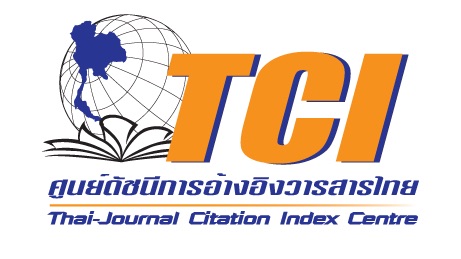The bargaining power of women in Chinese - Thai family through television series “In Family We Trust”
Keywords:
Bargaining Power, TV Series, Chinese - Thai familyAbstract
This research is to study the bargaining power of women in Chinese-Thai families through a television drama. The composition of the creation meanings and symbolic that appear in the drama, “In Family, We Trust” with the objective of analyzing the semantic meaning and decoding the symbolic meaning of the power bargaining of women in Chinese-Thai families on “In Family, We Trust”. By using text analysis with decoding and coding according to the concept of phonology and the assembly to create meaning as a research tool for reflect the Thai drama of Chinese descent, negotiating power of women in Thai families of Chinese descent of Thai society. The research results found out that the decoding and coding analysis by using text analysis. Demonstrate that the creation of meaning in the television series “In Family We Trust”. It can be divided into 3 roles which are (1) role as a mother. It was found that motherhood still had problems in power relations within the family. The role of negotiating with masculine status when it comes to being a pillar of family and if you would like to become a complete mother, legally marriage must be registered. (2) The role as a daughter. It was found that love and care from parents are inferior to their sons. They also received a lesser inheritance than their son. In some respects, the family rights were not granted, and (3) the role of business leadership. It was found that female leaders were given equal space and opportunity with men. The surrounding society accepts more potential. Therefore, the study of the power negotiation of women in Chinese-Thai families through the TV drama “In Family, We Trust”, making man aware of the present image of Thai society of Chinese descent Changes in the role of womanhood in Thai-Chinese families, to predict the future of Thai society.
References
กาญจนา แก้วเทพ. (2545). สื่อสารมวลชน: ทฤษฎีและแนวทางการศึกษา. พิมพ์ครั้งที่ 3. กรุงเทพฯ: โรงพิมพ์ศาลาแดง.
ปรีดา อัครจันทโชติ. (2018). ความเป็นจีนในละครโทรทัศน์ไทย. วารสารนิเทศศาสตร์ จุฬาลงกรณ์มหาวิทยาลัย, 36(1), 1-20.
ปิ่นหล้า ศิลาบุตร. (2008). สถานภาพและบทบาทของตัวละครหญิงในนวนิยายของปิยะ พรศักดิ์เกษม(วิทยานิพนธ์ปริญญามหาบัณฑิต). นครปฐม: มหาวิทยาลัย
ศิลปากร).
ผาสุก พงษ์ไพจิตร. (2546). เอกลักษณ์ชาติพันธุ์ของคนไทยเชื้อสายจีน (วิทยานิพนธ์ ปริญญามานุษยวิทยา). กรุงเทพฯ: จุฬาลงกรณ์มหาวิทยาลัย.
วิลาสินี พิพิธกุล. (2544). ผู้หญิงกับเทคโนโลยีข่าวสาร : แนวทฤษฎีและข้อเสนอแนะ สตรีศึกษา 2: ผู้หญิงกับประเด็นต่าง ๆ. กรุงเทพฯ: สำนักงานคณะกรรมการ
ส่งเสริมและประสานงานสตรีแห่งชาติ สำนักงานปลัดสำนักนายกรัฐมนตรี.
รวิช ตาแก้ว. (2552). “แม่”: มุมมองเรื่องเล่าในบริบทของสังคมไทย.วารสารการศึกษาไทย, 6(59), 10-14.
เสนาะ เจริญพร. (2548). ผู้หญิงกับสังคมในวรรณกรรมไทยยุคฟองสบู่. กรุงเทพฯ: ศิลปวัฒนธรรม.
อดุลย์ รัตนมั่นเกษม. (2551). กำเนิดและวิวัฒนาการของคนจีนแต้จิ๋วในไทยอดีตถึง ปัจจุบัน. กรุงเทพฯ: ขุนเขา.
Allport, G. W., & Vernon, P. E. (1930). The field of personality. Psychological bulletin, 27(10), 677.
Bhasin, K. What is Patriarchy (New Delhi: Kali for Women, 1993). Lerner, Gerda, The Creation of Patriarchy (Oxford: Oxford University Press, 1986), 20-22.
Hall, S. (1997). The work of representation. Representation: Cultural representations and signifying practices, 2, 13-74.
Millett, K. (2016). Sexual politics. Columbia University Press.
Yan, J., & Sorenson, R. (2006). The effect of Confucian values on succession in family business. Family business review, 19(3), 235-250.
Downloads
Published
How to Cite
Issue
Section
License

This work is licensed under a Creative Commons Attribution-NonCommercial-NoDerivatives 4.0 International License.







